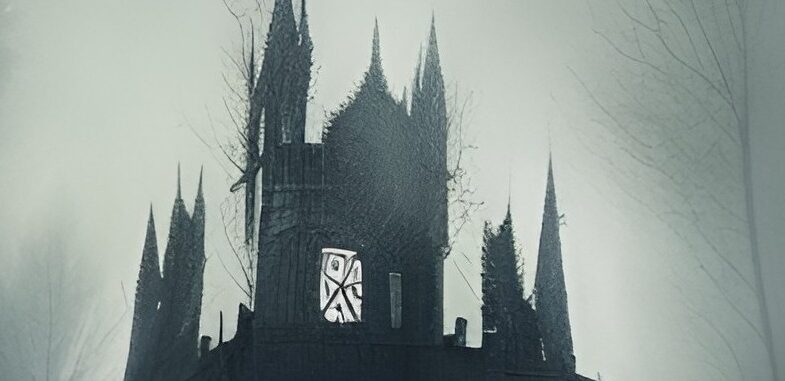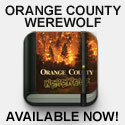The Decision
To read from the beginning, go here.
I shadowed my villainous uncle to the library, my physical training making it easy to keep up with him. despite having spent hundreds of hours in the room for study, it appeared he knew it better than I, for as I spied him from the balcony he stepped close to a bookcase, paused, then uttered the word, “Recludere.”
With that simple word, the bookcase slid open, and my uncle passed through the wall, leaving me to wonder what black and forbidden art he had mastered to allow for such an impossible mechanism. Witches and warlocks were still burned by the Church in Dunhill, but I knew from my studies that even this did not stop certain nobles from reaching for the personal power that the Left-Hand Path might convey.
Springing from my spot, I approached the bookcase to cautiously repeat the word. While I was surprised that the sturdy bookcase obeyed me as it had my uncle, I stepped into the dark corridor behind it.
The walls were lined with the same grey stone that the streets and buildings of Dunhill were constructed from, but my bare feet felt the ground slope downward and grow colder as I moved ahead. I went quietly and cautiously, only sparing a glance back as the bookcase slid shut behind me, sealing me in darkness.
I pawed my way along the path until a light could be seen ahead, illuminating an arched opening. I heard the crepitation of flames and the air grow slightly warmer as I stealthily moved to the side of the arched entrance.
The room I stared upon was large enough that its ceiling was not lit by the torches that dotted its walls. At a glance, I took it for a laboratory, so decorated it was by various tables with interconnected glass tubes, vials and alembics. However, the sight of a large cauldron, as empty as any abyss, sat in the middle of the wooden tables that surrounded it. At one of these, my uncle stood with his back to me, muttering to himself as he worked at something at a table. A repetitive slithering noise came from his direction.
Over the stropping I could hear some of his words. “All four elements are in place – temperature, diet, salts, and now Cole is of a proper age.” He stopped and held up a billhook in his hand, his examination of it putting his face into profile. “Jakob’s failure proves a blood relation is needed for a successful transference.” He spoke to no one, in a feverish tone that’s edges dripped with obsession. “Still, perhaps there is more to learn from a closer examination.”
He moved toward one of the other tables, atop which was a cloth covering an outline that made my blood run cold. Parts of the tarpaulin raised from the table with an unmistakably human outline. I wished nothing more than to flee as my uncle approached the table, but I felt paralyzed as if the cold of the floor had set icicles into my feet. I stared in horror as he pulled the cloth away, revealing the now ghostly corpse of Jakob.
I watched in stricken fright, my uncle thankfully directly between me and his ghastly work. Even so, the sounds of his cutting scratched a litany of fear into my brain, wiring me into place. My eyes only moved from him when Gildred stepped forward from a shadow holding a bowl in her hands. Slowly, now stained crimson up to his wrists, my uncle began to place organs into the bowl, one wet piece of tissue at a time.
I might have stayed frozen in place until caught if things had not taken an impossibly darker turn. In the midst of his bloody work my uncle lifted a piece of Jakob’s flesh to Gildred’s mouth. To my horror, the woman snapped at it with her white teeth until she ground it between them with an inhuman desire. My uncle continued to cut into what was once Jakob, setting organs aside and feeding his servant, as if the corpse were nothing but a prize from the Overlord’s hunting grounds.
This finally snapped me from my paralysis and I disappeared back down the tunnel from which I came. If I made any noise, my uncle and his servants were too wrapt in their own orectic cravings to notice me.
I wish that I could say I bravely sprung into action and alerted one of Dunhill’s Blackcoat inspectors, and that only their reputation for corruption and my uncle’s wealth made me think twice about informing the constabulary. Truth, though, is that I spent the rest of that night cowering under my sheets, haunted by the image of Jakob’s corpse and the sound of my uncle’s tools cutting into his flesh.
Only my hate for him saved me. Shaking with fear, the most frightened child inside me imagined my uncle, covered in blood, coming into my room, seeking to satisfy himself as he had so many times before and I, as so many times before, unable or unwilling to stop him.
That awful echo of past events rolled into an anger that flattened my fear and pushed me out of bed. Dawn had not yet sprung between Dunhill’s towers and smog while I performed my ablutions and dressed myself carefully, buttoning my vest and tying my cravat as if preparing for a funeral. It was then, as the burgeoning light of day broke through, that I decided to kill my uncle.
Although it felt it might crack my face like plaster, I smiled broadly as I went down the stairs, moving into the kitchen, insisting with a happy invasion to make my own breakfast. My uncle’s mention of salts made me reluctant to eat anything not prepared by myself. When the servants protested at my presence I pretended with a giddy air to be thrilled at Jakob’s unexplained departure and insisted I was demonstrating my usefulness. Before any of them could press upon this thin deceit, I banished them from the kitchen with a gleeful cackle and the wave of a meat-cleaver.
My tutors, though, long having suspected something amiss, gave little to no protest when my attentions wandered from my lessons. In the library I watched my uncle come or go from his subterranean laboratory. As the secret door of the bookcase was not immediately evident, my uncle merely repeated the lie that his entries and exits were checks on on my progress, which I cheerfully responded to with hardened smiles. When he was not there, though, I poured through the library to see what I could learn of him. I found that he had an extensive catalogue of journals, written in a simple cypher that he must have though impenetrable as the details therein would have gotten him burned at the stake if they were to be believed. And the contents, had I not witness what I had, would have been unbelievable.
The earliest entries were mundane. I read of how my uncle had made his fortune from shipping, having spent much time going to and from the islands of the West, where he had brought back from spices and gold trinkets, both of which he sold to Dunhill’s merchants at exorbitant prices. He also wrote, though, of his intermingling with the peoples there, most of whom were innocents he was happy to exploit. It was when he was traveling with a Dr. Brodie that he learned of a small island, excoriated by the all others, with a population that the other islanders simply call Nr. The Nr grew nothing, did no fishing, presided over no trade nor industry, but pillaged everything from their neighbors, who so feared them they offered no resistance. Any that did were butchered with such brutality that their entire tribe would remember their screams for a generation.
The king of the Nr, though, was feared above the rest as the king remembered every torture and psychological terror that could be wrecked upon fellow humans. The king, called so regardless of gender, was the receptacle of all Nr history and knowledge. Dr. Brodie and my uncle took great interest in how one individual could know, and be trusted to know, so much. The pair learned that when the king was ready and a child of theirs at the proper age (and there were always plenty of these as no clothing, timing, consent or decency kept the king from procreating with whomever they chose) a ritual was set upon them.
I believe it was then that my uncle crossed the line from being merely a flagitious old bugger to true evil. His journal entries at this stage took on a fevered and hallucinatory pitch, describing how the child was educated in what passed for Nr knowledge andforced to live in a cold dark cave of the island. There, the child was fed a specific diet, heavy in the sea salt of the local lagoon, until the time was deemed right. The tribe’s most trusted witch doctor’s would then bind the child and place them into a large open basket and the king would enter the cave. When whatever iniquitous incantations were performed in that darkness were complete, the cavalcade of evil emerged and the child was proclaimed king. The old king, now bound hand and foot in the basket as the child had been, was set upon by his erstwhile subjects and cannibalized.
Having bargained with the old king and then listened to new one, Uncle Daman became convinced that not just a transfer of knowledge had taken place, but a transfer of being. The old king, he wrote in barely legible script, had become the new king.
Dr. Brodie fell away from the journals’ pages, though I learned his death was recorded as an accident shortly after submitting a report to Queen Gloriana in which he recommended the complete extermination of the Nr. As the seat of the Queen’s, and indeed all of Britannia’s imperial administration, Dunhill’s usual brutality and thoughtlessness allowed this wise recommendation to pass without notice.
Whatever was behind Dr. Brodie’s fate, my uncle made many more trips to the island of the Nr, learning more of their ways and rituals, making whatever unholy promises he needed to in return. He augmented the knowledge he acquired upon these trips by acting as a messenger between the Nr and a splinter church of some power and ill-repute in Rzeczpospolita.
I also learned, most critically to me, that in all of his travels and carnal exploitations, my uncle had picked up more than one disease that he had cured, but left him with a weakened heart. It was this that inspired me and, with his insistence on my learning, became his undoing. My lessons in chemistry would be useful then as they are now, with the beakers, burners, and alembics of Uncle Daman’s laboratory becoming my start kit for his demise.























